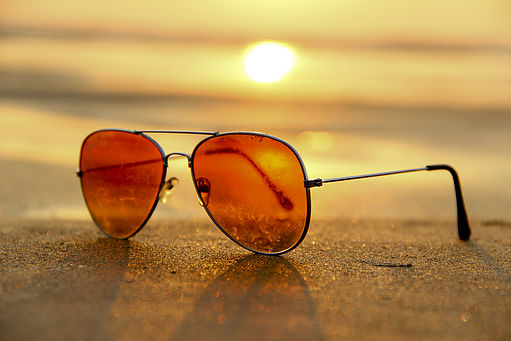
The first thing to consider when in the market for sunglasses is what kind of lifestyle you have. Many people don’t really think about the variety of sunglasses available, many of which are custom-designed for specific lifestyles. If you tend to be an impulse-buyer, maybe stop and think about which shades make the most sense for you. There are several factors to consider.
The lens should be the most important thing to consider when deciding on a sunglass purchase. The quality of lens you choose determines how well your eyes will be protected from UV radiation. Wearing a tinted lens does not mean your eyes are automatically protected from UV rays, so make sure to inquire about that (see below for more info).
If you are an active person who enjoys the outdoors, consider looking at a style best suited for a sporty day outside. Think: will these stay on my face? Are they especially fragile, or more durable? Can they withstand “the elements”? A high-quality pair for the active person will usually include polarized lenses.
What's the deal with polarized lenses? Should I get them?
Originally, polarized lenses were mainly worn by boaters and fishermen. Since a polarized lens reduces glare, it makes it much easier to see deeper into the water for viewing fish and other obstacles. Today, polarized lenses are enjoyed by the general public and offered by many popular sunglasses brands. Polarized lenses are beneficial for people who do a lot of driving and are also a great option for sports enthusiasts.
A polarized lens offers the following advantages over non-polarized lenses:
1) Improves visual comfort
2) Improves contrast and visual clarity
3) Reduces eyestrain
4) Allows for true perception of colors
5) Reduces reflections and eliminates glare
Misconceptions about UV Protection: Beware!
Wearing a tinted lens does not necessarily mean your eyes are protected from UV rays. Some tinted lenses lack any kind of UV protection; they simply look like they do. Lenses that are tinted but no UV protection can actually be more detrimental to your eyes than not wearing sunglasses at all.
The reason for this has to do with our pupillary size. When the eye is exposed to bright light, the pupil shrinks to allow less light through, protecting the back of the eye from damaging rays. When you wear tinted lenses you are shading your eyes, allowing your pupils to become larger in order to take in more light. So you are essentially allowing more UV radiation into your eyes and putting yourself at extra risk for damaging the back of the eye.
Wearing a lens that is both tinted and protects your eyes from harmful UV rays should be your number one priority. So go ahead, buy those snazzy shades! Just be sure to check that they offer 100% UV protection.
Source: http://vision.about.com/od/eyeglasses/a/Sunglasses.htm


